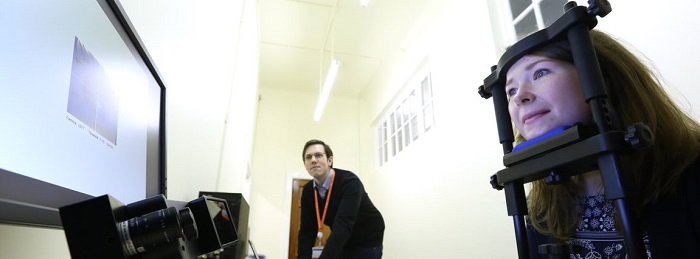
Psycholinguistics and Language Learning Lab
We are an interdisciplinary group that shares an interest in language processing and acquisition in a first and second language.
Our Labs are housed in the School of English in the Trent Building, where we do behavioural and eye-tracking research.
In the lab we have:
- EyeLink 1000+ with ExperimentBuilder and DataViewer
- E-Prime
- DMDX
- BioSemi Active-Two Amplifier and EDA & EMG electrodes
Psycholinguistics Research Group (PRG)
We are an active group in the Schools of English and Psychology who meet weekly to discuss research and develop research projects across the disciplines of psycholinguistics and first and second language processing.
If you are interested in joining, please email for information – or just show up at one of the meetings.
Meeting dates and times
The group usually meets weekly.
Tuesday 2:30 - 4:00pm
Venue: A49, Trent Building, University Park Campus
Contact
If you are interested in pursuing one of our projects for a PhD, please email the relevant supervisor(s).
Would you like to take part in language studies in one of our labs?
Sign up here to our Participant Pool and you will be emailed whenever a study is running with details about payment, study type, length, etc.
Members
Current Projects and Research Interests
Multi-word units & formulaic language (MWUs)
Conklin
What underpins the processing advantage for MWU (e.g. metaphors, idioms, binomials, compounds, collocations, phrasal verbs)?
Irony, emoticons & emotion
Thompson
How do we use and understand irony and emoticons? What is our emotional response to them?
Interlingual homographs, homophones, and cognates
Conklin
How does interlingual overlap influence second language processing?
Applying science to literature
Conklin, Guy, Scott, Sotirova
How do readers engage with actual literary texts, e.g. the variants in a text that editions make available?
Incidental language learning
Conklin
What words do learners acquire simply from reading or watching TV and movies?
Adaptation to accented speech
Buckler
How do we understand speakers of an unfamiliar accent so rapidly? How do children learn to do this?
Learning from variable input
Buckler
How do we speak to children? With so many sources of variation in the speech they hear, how do children learn the forms of words?
Back to top